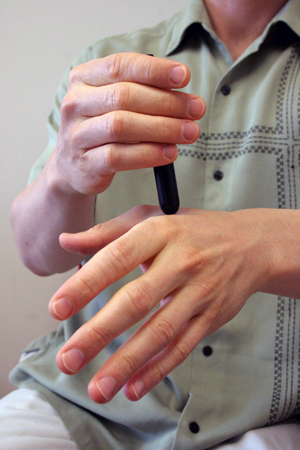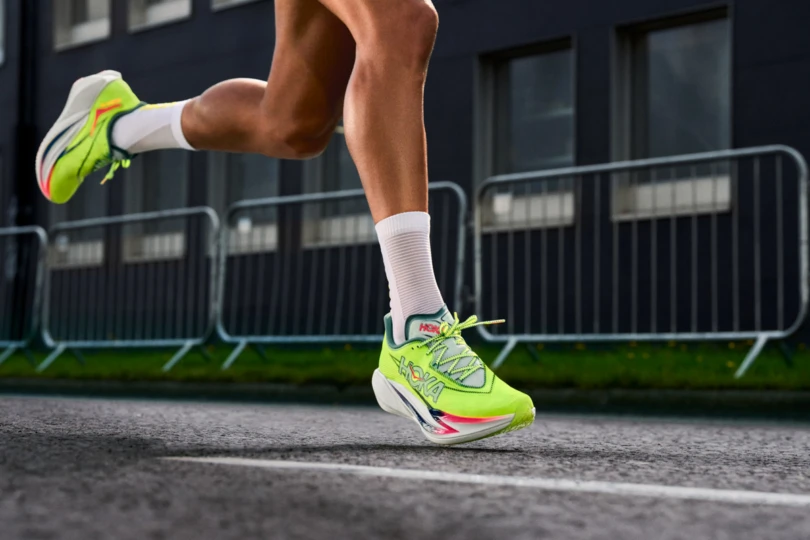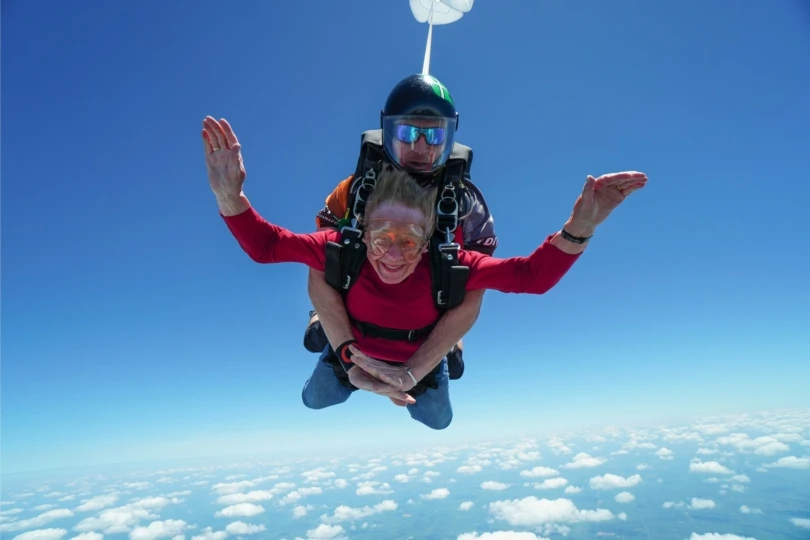By STEPHEN REGENOLD
Dr. Chris Frykman is pressing on my adrenal gland, fingers plunged in a fold of skin near my right kidney. His free hand manipulates my leg. “Can you pressure your foot toward the wall?” he asks.
I’m lying on my back under a fluorescent light. My head rests on the padded pillow of a chiropractic table, the centerpiece implement at Vibrant Potential, Frykman’s clinic in Shakopee, Minn.
“You feel that weakness?” the doctor asks, pushing my leg in a manual muscle test.

Frykman holds a case of glass vials to be employed in a nutrient sensitivity test.
It is early May, and I’ve come to Frykman’s office to undergo an assessment incorporating acupressure, chiropractic techniques, crystals, liquid concentrates and qigong, an ancient Chinese form of “energy work” — all treatments loosely governed by Frykman’s interpretation of an alternative medicine system called applied kinesiology.
Frykman, 31, teaches Taekwondo and is a certified triathlon coach. He is visibly healthy and in shape. When he speaks, an energy emanates from his gaze, an I-want-to-help-you look behind clean skin and immaculate teeth.
A husband and the father of three young girls, Frykman is easy to like, outright and passionate about the business he founded one year ago.
But after my first appointment — where he employed an electrified crystal stylus and vials of hydrochloric acid before wielding “thought energy” — I left in a quiet spell, half wondering whether he wasn’t a shaman dressed in casual clothes.
Controversial medicine
The International College of Applied Kinesiology (ICAK), a Kansas City-based organization, has certified more than 3,000 doctors to practice its namesake alternative medicine system. Developed in the 1960s, applied kinesiology (AK) is a holistic healthcare practice that evaluates structural, chemical and mental aspects of the body using manual muscle resistance testing.
“AK is used to enhance the findings of other standard forms of diagnosis that are used in Western medicine,” said Robert Blaich, a chiropractor in Denver who served as president of the International College of Applied Kinesiology (ICAK) for six years.

Vibrant Potential is Frykman’s one-room clinic in Shakopee, Minn.
Despite a worldwide following that numbers in the millions, AK has been tagged a pseudoscience by some psychologists and medical doctors. Since the 1980s, peer-reviewed medical journals have cited studies and double-blind tests where AK fails to pass scientific muster.
An equally-convinced movement of those who administer AK – mainly chiropractors but also medical doctors, dentists and acupuncturists – keeps the practice going strong. And dozens of scientific papers, Blaich said, demonstrate its effectiveness.
AK with a twist
At Vibrant Potential — where Frykman treats maladies as diverse as joint problems, runner’s diarrhea, shin splints and fertility issues — the techniques of diagnosis are unorthodox even by AK standards. Indeed, many of his methods are not approved by the ICAK, and Frykman is, voluntarily, no longer a member of the organization.
During my first visit, things began normal enough, with a chiropractic adjustment and muscle-resistance tests. But soon, in a whirlwind of treatments, Frykman popped out a crystal-tip pen, vials of acid, a tuning fork, and containers of liquids like the essence of asparagus.

Dr. Chris Frykman.
For a sensitivity test, I held food concentrates while Frykman pushed on my arm to detect reaction. He did not drop the liquid in my mouth, a method used in AK. I simply held the vial with no physical contact to the substance, my body sensing energy from molecules through the glass, he said.
I was on my back, staring at the ceiling, trying to comprehend. Frykman pressed on my arm and muttered. “Good,” he’d say. “Ok, got it.”
Weird Science
There is no shortage of patients willing to sing praise to Frykman’s practice, and his client list ranges from professional triathletes to local actors to businessmen.
“I wasn’t expecting it to work,” said Dan Bauman, 33, a vice president at a consulting firm in St. Paul. “But in one appointment Chris fixed a problem I’ve had half my life.”
Bauman, a softball player, injured a tendon in his upper arm at age 16. Medical doctors, Bauman said, would administer pain-killing cortisone shots, but could not fix the issue.
“Chris analyzed my body, said a large tendon was out of place, then he popped it back in.”
I signed up for two sessions not to resolve a major health issue, but for an analysis in the name of improving athletic performance. What I got included a nutrient test and an assessment of my spine and joints, which yielded a pelvic abnormality that could affect my running stride, Frykman said.

Frykman demonstrating the use of an electrified crystal stylus.
I learned that my skull could be “adjusted,” the plates that form my noggin shifting a smidge under a manual procedure. “Your head should feel like an unripe watermelon,” the doctor said, fingers pressing through my hair. “Not a bowling ball.”
Then it got weirder.
After the nutrient test, where I clutched glass vials, Frykman said I didn’t actually need the substances in hand. The energy of each substance, he continued, could simply be thought of, the mental figment metaphysically transmitted from his mind to my body.
He held my arm up, his eyes shut slightly as he skimmed through a mental checklist. “Asparagus,” he would think, pressing my arm, attempting to feel resistance.
“I know this freaks some people out,” he said.
I nodded, and soon thereafter I left the office.
Call up the web site for his clinic at www.vibrantpotential.com and you’re greeted with a recording, Frykman’s voice an excited welcome that hints to his personality. His writing skews to exclamation points and self-help axioms like “It is normal to love yourself and all others” or “You reside in a physical body and using it should bring you joy.”
Frykman was hard for me to figure out, a complex man who embodies the characteristics of an ancient healer, a motivational speaker and a medical doctor. His synthesized approach, for me, was no cure-all. Indeed, I came away with little to apply to my life, a list of sensitivities to foods I rarely eat and a recommendation to return once a week for a back crack.
He said we could talk about dream therapy on the next appointment, handing me a sheet detailing service plans with price tags up to $3,352.
Frykman is not a sham. He believes in what he’s doing and has patients to back his claims. For now, I’m just not one of them.
(Stephen Regenold writes The Gear Junkie column for eleven U.S. newspapers; see www.THEGEARJUNKIE.com for video gear reviews, a daily blog, and an archive of Regenold’s work.)






